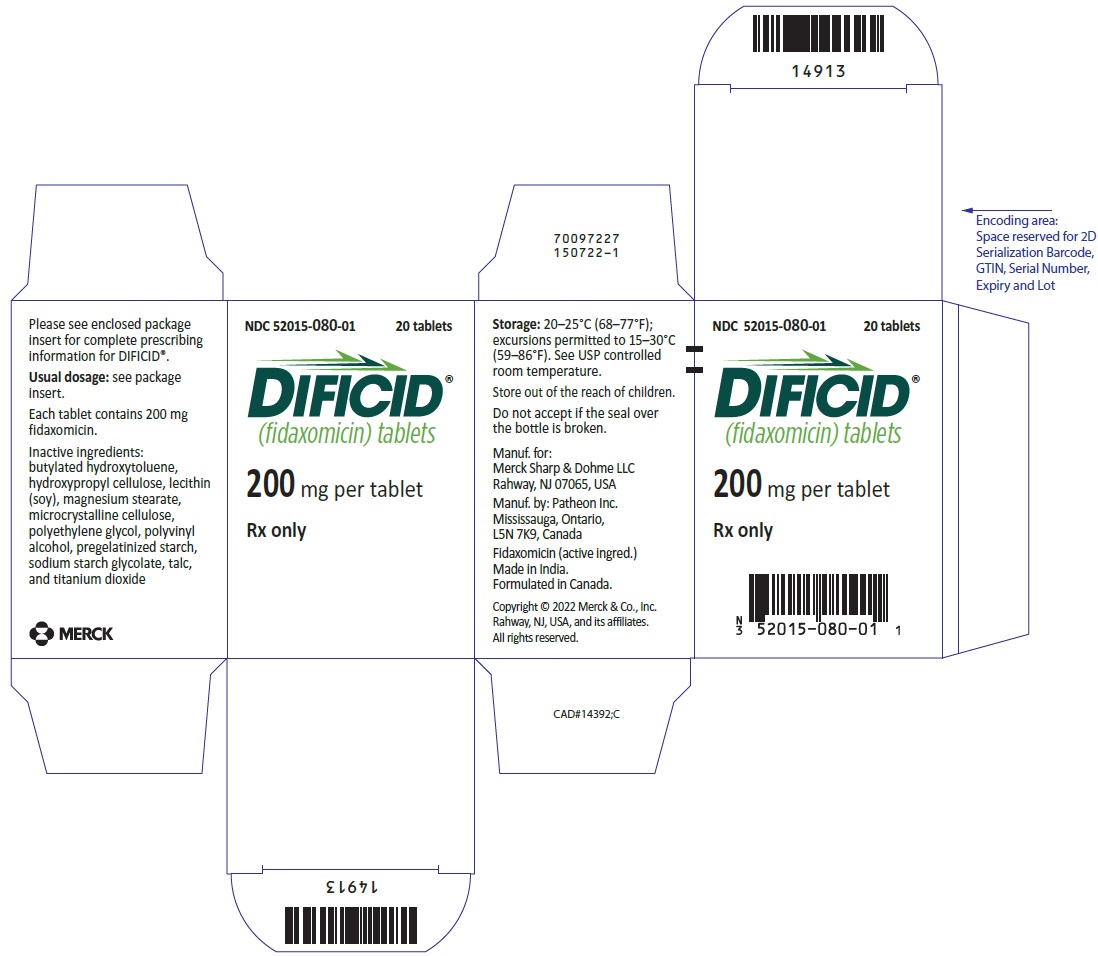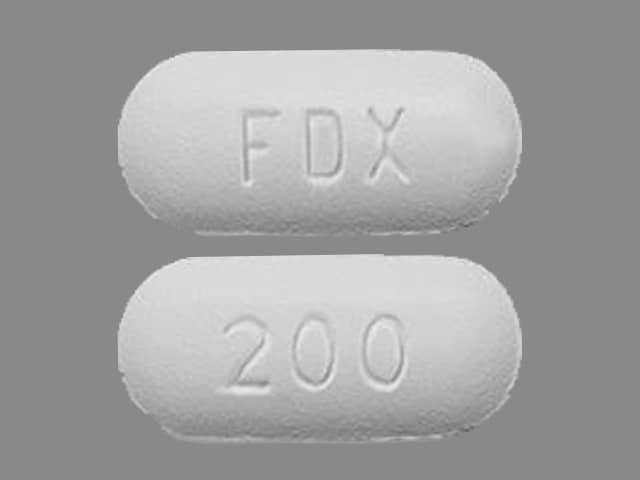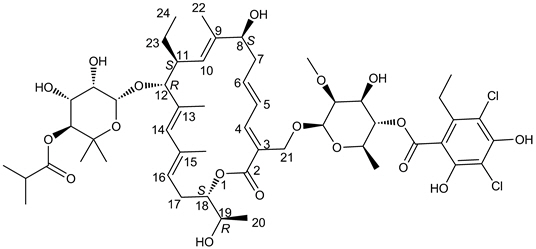Dificid
Generic name: fidaxomicin
Drug class: Macrolides
Medically reviewed by A Ras MD.
What is Dificid?
Dificid is an antibiotic medicine used to treat an infection called Clostridioides difficile-associated diarrhea (CDAD) in adults and children 6 months of age and older Clostridioides difficile (C-diff) is a bacterium that can cause an infection that can damage your colon and cause stomach pain and severe diarrhea.
Dificid is not to be used to treat other types of infections in the body. Sometimes infections are caused by viruses rather than bacteria. Antibiotic medicines, including Dificid, do not kill viruses. It is not known if Dificid is safe and effective in children under 6 months old.
Description
DIFICID (fidaxomicin) is a macrolide antibacterial drug for oral administration. Its CAS chemical name is Oxacyclooctadeca-3,5,9,13,15-pentaen-2-one, 3-[[[6-deoxy-4-O-(3,5-dichloro-2-ethyl-4,6-dihydroxybenzoyl)-2-O-methyl-β-D-mannopyranosyl]oxy]methyl]-12-[[6-deoxy-5-C-methyl-4-O-(2-methyl-1-oxopropyl)-β-D-lyxo-hexopyranosyl]oxy]-11-ethyl-8-hydroxy-18-[(1R)-1-hydroxyethyl]-9,13,15-trimethyl-, (3E,5E,8S,9E,11S,12R,13E,15E,18S)-. The structural formula of fidaxomicin is shown in Figure 1.
|
|
|
| Figure 1: Structural Formula of Fidaxomicin |
DIFICID tablets are film-coated and contain 200 mg of fidaxomicin per tablet and the following inactive ingredients: butylated hydroxytoluene, hydroxypropyl cellulose, lecithin (soy), magnesium stearate, microcrystalline cellulose, polyethylene glycol, polyvinyl alcohol, pregelatinized starch, sodium starch glycolate, talc, and titanium dioxide.
DIFICID for oral suspension is supplied as granules in bottles containing 5.45 g of fidaxomicin (40 mg of fidaxomicin per mL after reconstitution) and the following inactive ingredients: citric acid, microcrystalline cellulose, mixed berry flavor, sodium benzoate, sodium citrate, sodium starch glycolate, sucralose, and xanthan gum.
What is the most important information I should know about Dificid?
- Before you take Dificid, be sure you understand what it is for and how to take it.
- If you have questions about Dificid, ask your doctor or pharmacist.
- Remember that your doctor has prescribed Dificid only for you. Never give this medicine to anyone else.
- Keep this Patient Information for Dificid so you can read it again.
Who should not take Dificid?
Do not take Dificid if you are allergic to fidaxomicin, or any other ingredient in Dificid. See the end of this Patient Information for a complete list of ingredients in Dificid.
What should I tell my healthcare provider before taking Dificid?
Pregnancy
- If you are pregnant or plan to become pregnant, tell your doctor before you take Dificid.
- It is not known if Dificid will harm your baby while you are pregnant.
- If you are pregnant, you and your doctor should decide together if you will take Dificid.
Breastfeeding
- If you are breastfeeding or plan to breastfeed, tell your doctor before you take Dificid.
- It is not known if Dificid passes into breast milk.
- If you are breastfeeding, you and your doctor should decide together if you will take Dificid.
Other Medicines
- Tell your doctor about all of the medicines you take, including prescription and over-the-counter medicines, vitamins, and herbal and dietary supplements.
- Know the medicines you take. Keep a list of your medicines to show your doctor and pharmacist when you get a new medicine.
Allergic Reactions
- See “Who should not take Dificid?”
- If you are allergic to other kinds of antibiotics called macrolides (for example: azithromycin (Zithromax) or clarithromycin (Biaxin)) or any other ingredient in Dificid, tell your doctor.
See the end of this Patient Information for a complete list of ingredients in Dificid.
How should I take Dificid?
- Take Dificid tablets or oral suspension exactly as prescribed by your doctor.
- Take Dificid twice a day (approximately every 12 hours). For example, if you take your first dose at 8:00 a.m. you should take your second dose at 8:00 p.m.
- You can take Dificid with or without food.
- If Dificid oral suspension is prescribed for your child:
- Dificid oral suspension is a liquid that your pharmacist will mix before it is given to you.
- Store Dificid oral suspension in the refrigerator (see “How should I store Dificid?”).
- Take the bottle out of the refrigerator 15 minutes before giving the dose to your child.
- Shake the bottle well before each dose. Dificid oral suspension should be white to yellowish white.
- Remove the cap and measure the dose with the oral dosing syringe provided by your pharmacist.
- Give the dose by mouth to your child using the oral dosing syringe.
- Put the cap back on the bottle and store in the refrigerator after each dose.
- Do not skip any doses or stop taking Dificid until you finish your prescribed treatment, even if you begin to feel better, unless you have a serious allergic reaction (see “What are the possible side effects of Dificid?”).
This will lower the chance that the bacteria will become resistant to Dificid. If this happens, Dificid and other antibiotic medicines may not work in the future.
What are the possible side effects of Dificid?
Dificid can cause serious side effects, including:
- Allergic reaction. If you get a severe allergic reaction while taking Dificid, including problems breathing or shortness of breath, rash, itching or hives, or swelling of the mouth, throat, or face, stop taking Dificid and get emergency medical help right away.
Common side effects of Dificid include:
The most common side effects of Dificid in adults include:
- nausea
- vomiting
- stomach pain
- bleeding in the stomach or intestines
- low red blood cell count (anemia)
- low white blood cell count (neutropenia)
The most common side effects of Dificid in children include:
- fever
- vomiting
- diarrhea
- stomach pain
- constipation
- rash
- high levels of enzymes called aminotransferases in the blood, which may indicate liver damage
Other less common side effects of Dificid may include:
- swelling of any body part (such as your face, lips, tongue or around your eyes)
- itching
- hives
- bloating
- stomach tenderness
- heartburn
- problems swallowing
- high blood sugar (hyperglycemia)
- abnormal liver tests
- low levels of blood bicarbonate
- passing gas
- intestinal blockage
- serious bowel inflammation (toxic megacolon)
- low platelet count (important for clotting and to control bleeding)
- high levels of acid in your blood (metabolic acidosis)
If you have any side effect that bothers you or does not go away, tell your doctor.
There may be other side effects to Dificid that are not listed. Call your doctor for medical advice about side effects. You may report side effects to FDA at 1-800-FDA-1088
General information about the safe and effective use of Dificid
Medicines are sometimes prescribed for purposes other than those listed in the Patient Information. Do not take Dificid for a condition for which it was not prescribed. Do not give Dificid to other people, even if they have the same symptoms that you have. It may harm them. You can ask your pharmacist or doctor for information about Dificid that is written for health professionals.
What if I have questions?
- Call your doctor.
- Call Merck, the company that makes Dificid, at 1-800-444-2080.
- Go to the website – www.DIFICID.com.
- You can also find the full prescribing information written for doctors at www.DIFICID.com
How should I store Dificid?
- Store Dificid tablets at room temperature between 68°F to 77°F (20°C to 25°C).
- Keep Dificid in its original bottle until you are ready to take it.
Dificid for oral suspension
- Store Dificid oral suspension in the refrigerator between 36°F to 46°F (2°C to 8°C) for up to 12 days. Throw away (discard) any unused Dificid oral suspension by the date written on the bottle.
- Keep Dificid in its original child-resistant bottle with the cap on until you are ready to give it to your child.
Keep Dificid and all medicines out of the reach of children.
What are the ingredients in Dificid?
Dificid tablets
- Active ingredient: fidaxomicin.
- Inactive ingredients: butylated hydroxytoluene, hydroxypropyl cellulose, lecithin (soy), magnesium stearate, microcrystalline cellulose, polyethylene glycol, polyvinyl alcohol, pregelatinized starch, sodium starch glycolate, talc, and titanium dioxide.
Dificid for oral suspension
- Active ingredient: fidaxomicin.
- Inactive ingredients: citric acid, microcrystalline cellulose, mixed berry flavor, sodium benzoate, sodium citrate, sodium starch glycolate, sucralose, and xanthan gum.
Label
PRINCIPAL DISPLAY PANEL – 200 MG TABLET BOTTLE CARTON
- NDC 52015-080-01 20 tablets
- DIFICID®
(fidaxomicin) tablets - 200 mg per tablet
- Rx only
- Manuf. for:
Merck Sharp & Dohme Corp.,
a subsidiary of
MERCK & CO.,INC.
Whitehouse Station,
NJ 08889, USA - Manuf. by: Patheon Inc.
Mississauga, Ontario,
L5N 7k9, Canada - Fidaxomicin (active ingred.)
Made In India.
Formulated In Canada.


SRC: NLM .

